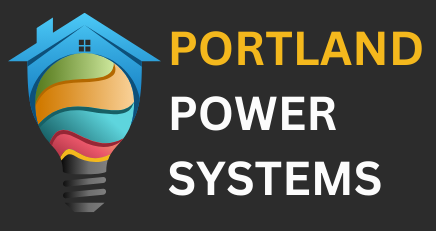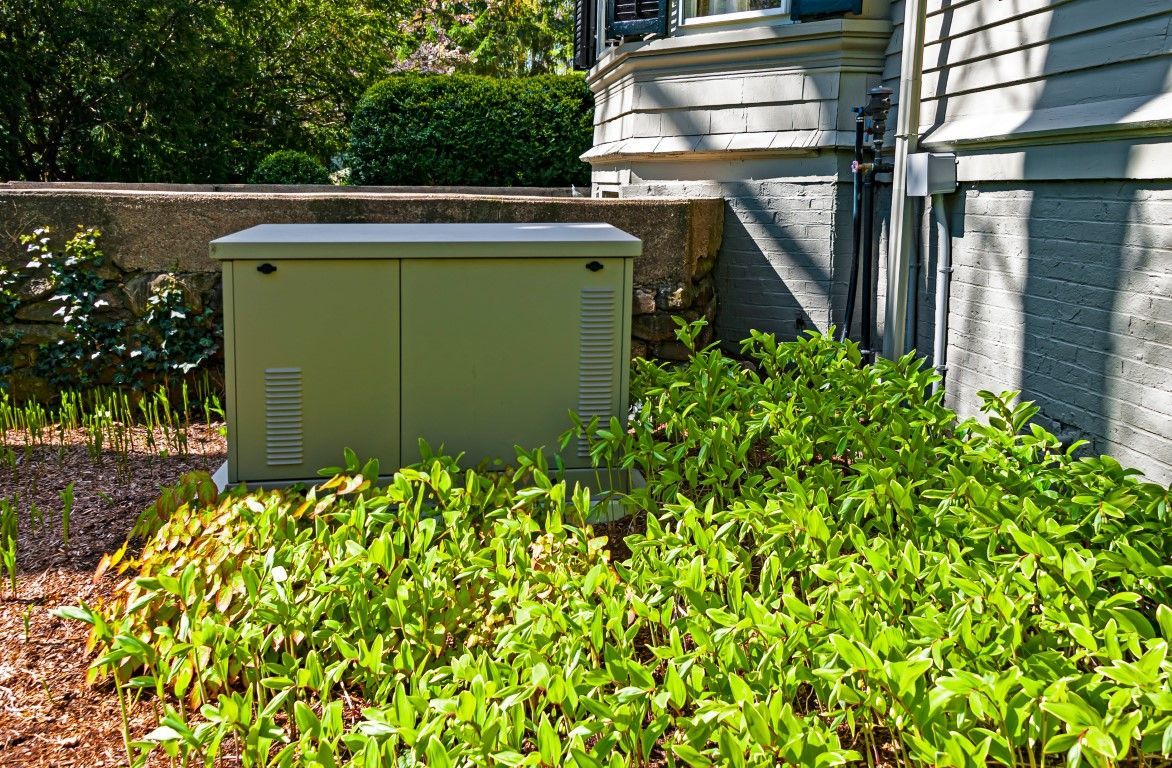
Residential Generators in Portland OR
A residential generator is a backup power system designed to keep your home running smoothly during a power outage. It provides electricity to essential appliances and systems when the regular power supply fails. There are several types of residential generators to consider, each with its own advantages:
- Portable Generators: These are versatile and can be moved around as needed. They typically run on gasoline and are ideal for short-term outages or for powering specific appliances.
- Standby Generators: These are permanently installed outside your home and automatically turn on when there is a power outage. They run on natural gas or propane and can power your entire home.
- Inverter Generators: Known for their quiet operation and fuel efficiency, inverter generators are great for providing stable power for sensitive electronics. They are often portable and run on gasoline.
Key Features to Consider
When choosing a residential generator, it’s important to evaluate several key features to ensure it meets your needs. First, consider the power output or wattage to determine if it can handle the electrical load of your home. The generator’s runtime and fuel efficiency are also crucial, as they affect how long and how cost-effectively the generator can operate during an outage. Additional features to look for include noise levels, ease of maintenance, and safety features such as automatic shut-off and carbon monoxide detection. It's also beneficial to choose a generator with a user-friendly control panel and reliable customer support.
Professional Installation
Proper installation of your residential generator is essential for its optimal performance and safety. Professional installers ensure that the generator is set up according to local codes and regulations. They handle the placement of the unit, electrical connections, and any necessary permits. A well-executed installation will prevent potential issues and ensure that your generator operates smoothly when you need it most.

We will get back to you as soon as possible.
Please try again later.
Checking Fuel Levels and Connections
Regular maintenance involves checking fuel levels and connections to ensure that your generator remains in good working condition. For portable generators, this means monitoring the fuel tank and refilling it as needed. Standby generators typically use natural gas or propane, so it's important to inspect the fuel supply lines and connections periodically. Ensuring that these components are in good shape helps avoid potential problems during an outage.
Testing the Generator Regularly
Testing your generator on a routine basis is crucial to confirm that it will function correctly during an emergency. Most experts recommend running a test once a month to ensure that the generator starts up and operates properly. This routine check helps identify any issues before they become serious problems and ensures that your generator is ready when you need it.
Troubleshooting Common Issues
Even with regular maintenance, issues can arise with your generator. Common problems include difficulty starting the generator, unusual noises, and inconsistent power output. If you encounter any of these issues, consult the generator’s manual for troubleshooting tips. Many problems can be resolved with simple adjustments or by replacing minor components. However, for more complex issues, it may be necessary to contact a professional for assistance.
Initial Purchase, Installation, Ongoing Operating, and Maintenance Expenses
Understanding the costs associated with a residential generator is important for budgeting. The initial purchase price varies based on the generator type, brand, and power output. Installation costs depend on the complexity of the setup and local labor rates. Ongoing operating expenses include fuel costs and any required maintenance, such as oil changes and filter replacements. Regular maintenance ensures the longevity and reliability of your generator, helping to prevent costly repairs in the future.
Benefits of Having a Residential Generator
Investing in a residential generator offers numerous benefits. It provides peace of mind knowing that your home will remain powered during an outage, allowing you to maintain comfort and safety. A generator ensures that essential appliances, such as refrigerators and medical equipment, continue to function. It also protects your home’s electrical systems from potential damage caused by power surges or outages.
If you’re considering a
residential generator in Portland, OR, we’re here to help. Our team of experts can guide you through the selection process, provide professional installation, and offer ongoing maintenance services. Contact us today to learn more about how a residential generator can benefit your home and ensure you’re prepared for any power outage.
Residential Generators: What You Need to Know Before Buying
In today's world, having a reliable power source is crucial. Whether you're dealing with frequent power outages or simply want to be prepared for emergencies, investing in a residential generator can be a smart move. Solar generators, in particular, are gaining popularity due to their eco-friendly nature and efficiency. When selecting a solar generator, several factors should be taken into account to ensure you choose the right one for your needs.

Cost and Warranty
Solar generators can vary significantly in price. While it's tempting to go for the cheapest option, consider the long-term value and reliability of the unit. Compare prices and features to find a balance between cost and quality. Additionally, check the warranty offered by the manufacturer. A good warranty can provide peace of mind and protect your investment.
Environmental Impact
One of the main advantages of solar generators is their minimal environmental impact. They use renewable energy and produce no emissions. If being environmentally friendly is important to you, make sure the generator you choose aligns with your values.
Choosing the right solar generator can make a significant difference in your home's energy resilience. If you have questions or need help selecting the perfect generator for your needs, our team is here to assist you. We offer expert advice and a range of high-quality solar generators to suit various requirements. Contact us today to discuss your options and find the best solution for your home. Our knowledgeable staff is ready to help you make an informed decision and ensure you’re prepared for any power needs that arise.
Power Needs
Assess how much power you need for your home. Solar generators come with various power capacities, so determine the essential appliances and devices you want to run. This might include refrigerators, lights, medical equipment, or home office electronics. Understanding your power requirements will help you select a generator with the appropriate capacity.
Battery Storage
The battery storage of a solar generator dictates how long it can power your devices before needing a recharge. Look for a generator with sufficient battery capacity to meet your needs. Larger batteries can store more energy but may come at a higher cost. Consider how often you might need to use the generator and how long you require power during an outage.
Solar Panel Efficiency
Solar panels convert sunlight into electricity, and their efficiency affects how quickly the generator recharges. Higher efficiency panels can generate more power in less time, which is especially useful if you need a quick recharge. Evaluate the solar panel technology and its efficiency ratings to ensure you get a generator that suits your needs.
Portability and Size
Depending on your usage, you might need a portable generator or a more stationary unit. Portable solar generators are great for camping or small emergency situations, while larger units are better suited for home use. Consider the size and weight of the generator, and ensure you have adequate space for installation and storage.
Durability and Build Quality
A generator’s durability is important, especially if it will be exposed to the elements. Look for models with sturdy construction and weather-resistant features. Check reviews and specifications to gauge how well the generator withstands various environmental conditions.
Ease of Use and Maintenance
Choose a generator that is easy to operate and maintain. Look for user-friendly controls and clear instructions. Some generators offer features like automatic shut-off and maintenance alerts, which can be beneficial. Regular maintenance is essential to keep the generator running efficiently, so consider models that offer straightforward upkeep.
Understanding the Cost of Residential Generators: Is It Worth It?
In recent years, the demand for residential generators has surged as homeowners seek reliable power solutions during outages. The idea of having a backup power source is appealing, especially in areas prone to storms or frequent power interruptions. However, the decision to invest in a residential generator involves more than just considering its initial cost. Understanding the overall expenses and benefits is crucial to determining whether this investment is worthwhile for you.
Initial Purchase Price
The cost of a residential generator can vary significantly based on its size, type, and brand. Basic models start around $2,000, while high-end systems with advanced features can exceed $10,000. Factors influencing the price include the generator's capacity, which determines how many appliances it can power, and its fuel type—natural gas, propane, or diesel. Larger generators with greater power output and more sophisticated technology typically come with a higher price tag.
Installation Costs
Beyond the purchase price, installation is another significant expense. Professional installation is recommended to ensure the generator is properly connected to your home's electrical system and complies with local codes. Installation costs can range from $1,000 to $5,000, depending on the complexity of the setup and the distance from the generator to your electrical panel. Proper installation is crucial for the safe and efficient operation of your generator.
Maintenance and Operating Costs
Generators require regular maintenance to ensure they function properly when needed. Maintenance costs can include routine inspections, oil changes, and filter replacements. On average, maintenance can cost between $200 and $400 annually. Additionally, operating costs depend on the fuel type and frequency of use. For instance, natural gas and propane tend to be more economical compared to diesel.
Long-Term Benefits
Despite the upfront costs, residential generators offer significant long-term benefits. They provide peace of mind by ensuring you have power during outages, which can be critical for preserving food, maintaining heating or cooling systems, and keeping essential devices running. For those in areas with frequent power disruptions, the reliability and convenience of having a generator can outweigh the initial investment.
Resale Value
Investing in a high-quality generator can also add value to your home. Potential buyers often view a generator as a desirable feature, especially if it’s a well-maintained and reliable model. This added value can be a plus if you decide to sell your home in the future.
Cost-Benefit Analysis
When evaluating whether a residential generator is worth the cost, consider your specific needs and circumstances. If you live in an area with frequent power outages or have critical systems that must remain operational, the benefits of a generator can far exceed the costs. However, if power outages are rare and manageable with temporary solutions like portable generators or battery backups, the investment might not be justified.
If you're considering a residential generator and need guidance on choosing the right model for your needs, or if you have questions about installation and costs, don't hesitate to reach out to us. Our team of experts is here to help you navigate the options and make an informed decision. Contact us today to discuss your needs and explore the best solutions for reliable power in your home.
Let's Connect!
Looking for dependable power solutions? Hire us for expert assistance. Our team is dedicated to ensuring your home or business stays powered during outages, providing peace of mind and security. Trust us to handle your power needs with professionalism and expertise.